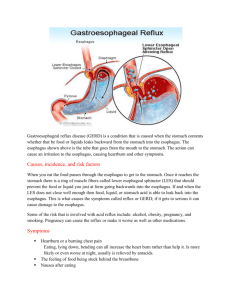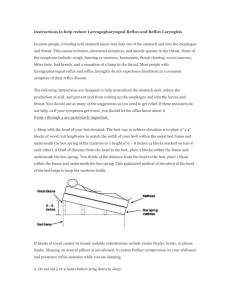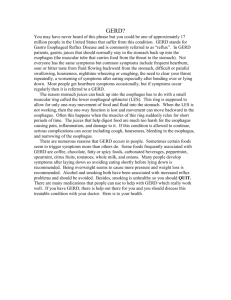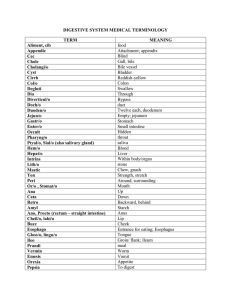If you have acid reflux or Gastroesophageal Reflux Disease (GERD)…you... alone! Over 15 million Americans suffer from daily heartburn...
advertisement
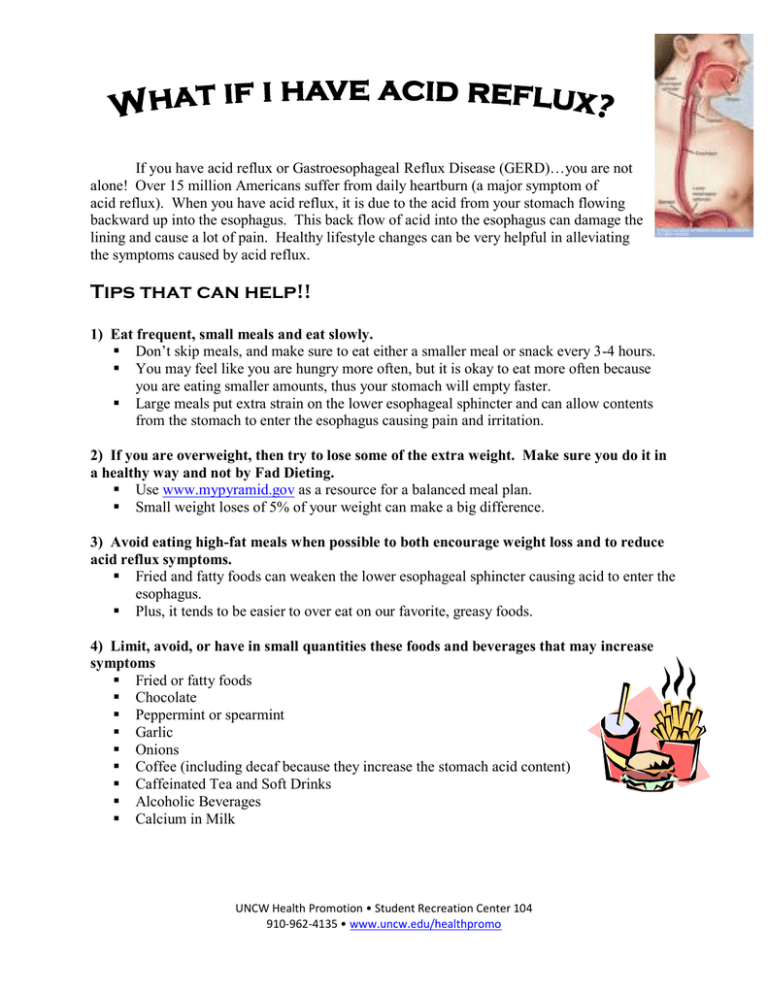
If you have acid reflux or Gastroesophageal Reflux Disease (GERD)…you are not alone! Over 15 million Americans suffer from daily heartburn (a major symptom of acid reflux). When you have acid reflux, it is due to the acid from your stomach flowing backward up into the esophagus. This back flow of acid into the esophagus can damage the lining and cause a lot of pain. Healthy lifestyle changes can be very helpful in alleviating the symptoms caused by acid reflux. Tips that can help!! 1) Eat frequent, small meals and eat slowly. Don’t skip meals, and make sure to eat either a smaller meal or snack every 3-4 hours. You may feel like you are hungry more often, but it is okay to eat more often because you are eating smaller amounts, thus your stomach will empty faster. Large meals put extra strain on the lower esophageal sphincter and can allow contents from the stomach to enter the esophagus causing pain and irritation. 2) If you are overweight, then try to lose some of the extra weight. Make sure you do it in a healthy way and not by Fad Dieting. Use www.mypyramid.gov as a resource for a balanced meal plan. Small weight loses of 5% of your weight can make a big difference. 3) Avoid eating high-fat meals when possible to both encourage weight loss and to reduce acid reflux symptoms. Fried and fatty foods can weaken the lower esophageal sphincter causing acid to enter the esophagus. Plus, it tends to be easier to over eat on our favorite, greasy foods. 4) Limit, avoid, or have in small quantities these foods and beverages that may increase symptoms Fried or fatty foods Chocolate Peppermint or spearmint Garlic Onions Coffee (including decaf because they increase the stomach acid content) Caffeinated Tea and Soft Drinks Alcoholic Beverages Calcium in Milk UNCW Health Promotion • Student Recreation Center 104 910-962-4135 • www.uncw.edu/healthpromo 5) Limit or avoid these foods that can irritate a damaged esophagus if you are having a flare up. Citrus fruits and juices (orange juice, apple juice, grapefruit, etc.) Tomatoes and tomato products Pepper Chili Pepper (some research shows that capsaicin, a phytochemical, may increase the sensitivity of the esophagus lining) 6) Have heartburn helpers handy. These foods can help activate saliva production. Saliva is basic and works as a slight buffer for the esophagus. o Chewing gum (not flavored with peppermint or spearmint) o Sucking on antacids or lozenges o Drinking lots of water o Eating sweet pickles 7) Don’t eat 3-4 hours before you go to bed. Or don’t lie down after eating. When you lie down, it is easier for the stomach acids to flow into your esophagus. 8) Make other healthy lifestyle changes! Stop smoking Reduce Stress! Exercise Elevate the head of the bed 6 inches so you are more upright. 9) Keep a food record and remember your triggers! Remember nutrition is very individual and some things may bother you that don’t bother others. The best way to recognize these foods and to remember them is to keep a food record and record how you are feeling after each meal. You may notice that every time you eat raw green peppers you have acid reflux. Now you know to limit or avoid green peppers. Student Recreation Center 104 ▪ 910-962-4135 ▪ www.uncw.edu/healthpromo UNCW Health Promotion • Student Recreation Center 104 910-962-4135 • www.uncw.edu/healthpromo
